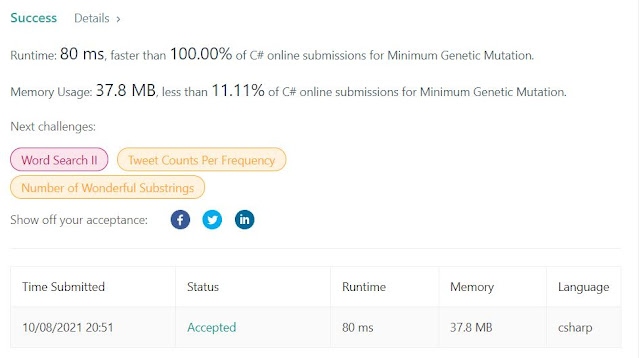Min and Max Problems: either DP or BFS
A gene string can be represented by an 8-character long string, with choices from 'A', 'C', 'G', and 'T'.
Suppose we need to investigate a mutation from a gene string start to a gene string end where one mutation is defined as one single character changed in the gene string.
- For example,
"AACCGGTT" --> "AACCGGTA"is one mutation.
There is also a gene bank bank that records all the valid gene mutations. A gene must be in bank to make it a valid gene string.
Given the two gene strings start and end and the gene bank bank, return the minimum number of mutations needed to mutate from start to end. If there is no such a mutation, return -1.
Note that the starting point is assumed to be valid, so it might not be included in the bank.
Example 1:
Input: start = "AACCGGTT", end = "AACCGGTA", bank = ["AACCGGTA"] Output: 1
Example 2:
Input: start = "AACCGGTT", end = "AAACGGTA", bank = ["AACCGGTA","AACCGCTA","AAACGGTA"] Output: 2
Example 3:
Input: start = "AAAAACCC", end = "AACCCCCC", bank = ["AAAACCCC","AAACCCCC","AACCCCCC"] Output: 3
Constraints:
start.length == 8end.length == 80 <= bank.length <= 10bank[i].length == 8start,end, andbank[i]consist of only the characters['A', 'C', 'G', 'T'].
public class MutationQueueItem
{
public string gene = "";
public int steps = 0;
public MutationQueueItem(string gene, int steps)
{
this.gene = gene;
this.steps = steps;
}
}
public int MinMutation(string start, string end, string[] bank)
{
Queue queue = new Queue();
Hashtable used = new Hashtable();
MutationQueueItem mqi = new MutationQueueItem(start, 0);
queue.Enqueue(mqi);
used.Add(start, true);
while (queue.Count > 0)
{
MutationQueueItem currentMqi = queue.Dequeue();
if (currentMqi.gene.Equals(end))
{
return currentMqi.steps;
}
string[] candidates = ValidCandidates(currentMqi.gene, bank, used); //Adding to used inside ValidCandidates!!!
if (candidates.Length > 0)
{
foreach (string candidate in candidates)
{
MutationQueueItem newMqi = new MutationQueueItem(candidate, currentMqi.steps + 1);
queue.Enqueue(newMqi);
}
}
}
return -1;
}
public string[] ValidCandidates(string current, string[] bank, Hashtable used)
{
List retVal = new List();
foreach (string b in bank)
{
if (!used.ContainsKey(b))
{
int diff = 0;
for (int i = 0; i < current.Length; i++)
{
if (current[i] != b[i])
{
diff++;
if (diff > 1)
{
break;
}
}
}
if (diff == 1)
{
retVal.Add(b);
used.Add(b, true);
}
}
}
return retVal.ToArray();
}




Comments
Post a Comment